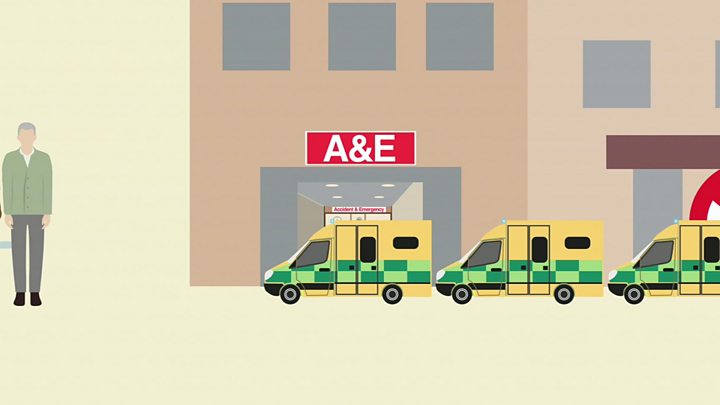The worst is yet to come for the NHS
The NHS in England may suffer its worst winter in recent history if it does not receive an emergency bailout, hospital chiefs are warning.
They say the cash is needed to pay for extra staff and beds because attempts to improve NHS finances have failed.
The government has given councils an extra £1bn for social care services, to help relieve the pressure on hospitals.
But the latest figures show AE waits and bed shortages remain “stubbornly” bad, according to NHS Providers.
The group, which represents NHS chief executives, is calling for between £200m and £350m to be made available immediately.
The target to see most patients in AE within four hours has been missed for two years now, while bed occupancy rates remain above recommended levels.
Over the summer, just over 90% of AE patients were treated or admitted within four hours.
That was below the goal of 95% and was almost exactly the same percentage as last summer, which was then followed by the worst set of winter waiting times since the target was introduced in 2004.
Chris Hopson, chief executive of NHS Providers, said: “Last winter the health service came under pressure as never before. This winter could be worse.”
He acknowledge that planning had been much better this year but said that despite those efforts, and the extra money for care services, hospitals were still struggling to improve performance.
“We are in virtually the same position as this time last year,” he said.
“Unless we get extra money, patients will be put at greater risk as local trusts won’t have the beds and staff they need to meet the extra demand we will face.”
Winter worries
Mr Hopson said feedback from his members showed that delays in discharging patients, and workforce shortages, were hampering their efforts.
He pointed out that the NHS budget had increased by only 1.3% this year compared to a 5% rise in demand.
The call for more money comes ahead of a meeting of NHS leaders and Prime Minister Theresa May, which is expected to take place next week.
It is understood Mrs May has called in bosses at NHS England, and the regulator NHS Improvement, to check on plans for this winter.

The Colchester Hospital University chief executive, Nick Hulme, said the past few months had been “as challenging as any I can remember – there has been no let up.”
“Our major concern going into this winter is staff – we are 50 junior doctors short on our rotas across the hospital. Every day is a constant struggle.”
And John Lawlor, who is chief executive of Northumberland, Tyne and Wear NHS Trust, which runs mental health services, said: “Pressures on staffing, especially in psychiatry, are beginning to impact on services.”
But the government maintained that the £1bn extra for social care, coupled with a £100m fund set aside to get GPs into AE departments to help see patients, would have an impact.
A Department of Health spokeswoman said: “The NHS has prepared for winter more this year than ever before.”
Meanwhile, NHS England national director for urgent and emergency care, Pauline Philip, said she had already received feedback from hospitals that more than 3,000 new beds would be opened in the coming months which would help alongside the measures being taken nationally.